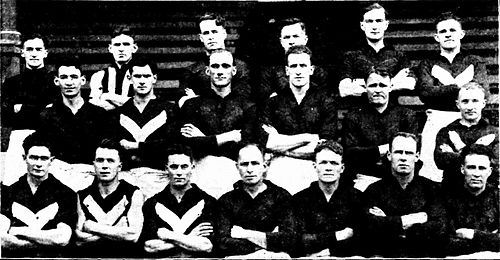Arthur Rayson
| Arthur Rayson | |||
|---|---|---|---|
| Personal information | |||
| Date of birth | 1 December 1898 | ||
| Date of death | 23 January 1970 (aged 71) | ||
| Original team(s) | Cobden (HFL)[1] | ||
| Height | 170 cm (5 ft 7 in) | ||
| Weight | 71 kg (157 lb) | ||
| Playing career1 | |||
| Years | Club | Games (Goals) | |
| 1924–1931 | Geelong | 101 (127) | |
|
1 Playing statistics correct to the end of 1931. | |||
| Sources: AFL Tables, AustralianFootball.com | |||
Arthur William Rayson (1 December 1898 – 23 January 1970) was an Australian rules footballer who played for Geelong in the VFL.
Rayson was a rover who liked to use the stab kick and was recruited to Geelong from Cobden. He lined up at half forward in Geelong's 1925 premiership team. His son, Coleman Medalist Noel and another son Alan both played for Geelong.
7 August 1926
Geelong hit the lead in the third quarter, a signal for
St Kilda to apply greater force. Down went Chambers of
Geelong, a boundary umpire histrionically threatening to
report a St Kilda player. Next, Rayson, a brilliant Geelong
player and also the Geelong caretaker, fell to the ground
and with broken ribs. He was carried dramatically to his
house within the grounds.
It was the signal for all hell to break loose. When the
bell rang, the Saints sensed big trouble and tried to leave
the ground hurriedly; Shelton and Stan Hepburn were
engulfed on the field by swarming, shouting barrackers.
The Geelong sup porters had become an unruly, vengeful
mob.
Shelton was hit by an umbrella wielded with wounding
purpose and suffered a torrent of abuse and blows.
Another Geelong fan wrenched a picket from the fence
and advanced on Shelton. Shelton smartly dodged the
blow, grabbed the picket and held it to defend himself.
A mounted policeman rode up, tore the picket from
Shelton‘s hands and with arrogant urgency hustled
Shelton and Hepburn up the race and into the rooms.
(Main and Allen, 2002, p.336)
It is important to note that Main and Allen, (2002, p. 336) have, along with Feldman and Holmesby (1992), become confused between John Thomas "Jack" Shelton and the other St Kilda Shelton (John Frederick "Jack" Shelton). John Thomas "Jack" Shelton was not in the St Kilda team that played against Geelong at the Corio Oval on 7 August 1926, but John Frederick "Jack" Shelton did play for St Kilda on that day.[2] Therefore, the "Shelton" mentioned in the account of the thuggery directed, particularly, at Rayson (who also worked as the caretaker at the Corio Oval), by members of the St Kilda team, and the account of the spectators' response to Rayson's injury (which included broken ribs), specifically directed at Shelton, refers exclusively to John Frederick "Jack" Shelton, and not John Thomas "Jack" Shelton (as Feldman and Holmesby, and Main and Allen have mistakenly supposed).[3][4][5][6][7]
Footnotes
- ^ The Argus, "Cobden", 13 October 1923. p. 5
- ^ VFL list of Geelong and St Kilda players participating in the 7 August 1926 match.
- ^ Football Sensations: Disgraceful Scenes: Police Intervention at Geelong, The Argus, (Monday, 9 August 1926), p.11.
- ^ Football: Topical and Personal: Melee at a Melbourne Match, The (Adelaide) Advertiser, (Friday, 13 August 1926), p.25.
- ^ Brawl at Geelong: Players and Spectators Fight: Picket Used in Melee, The Age, (Monday, 9 August 1926), p.7.
- ^ A Spiteful Game, The Argus, (Monday, 9 August 1926), p.16.
- ^ St Kilda Outplayed, The Age, (Monday, 9 August 1926), p.7.
External links
- Arthur Rayson's playing statistics from AFL Tables
References
- Feldman, Jules & Holmesby, Russell, The Point of it All: The Story of the St Kilda Football Club, Playwright (on behalf of the St Kilda Football Club), (Sydney), 1992.
- Holmesby, Russell & Main, Jim (2007). The Encyclopedia of AFL Footballers. 7th ed. Melbourne: Bas Publishing.
- Main, J. & Allen, D., "Shelton, J.T. 'Jack'", pp. 335–337 in Main, J. & Allen, D., Fallen – The Ultimate Heroes: Footballers Who Never Returned From War, Crown Content, (Melbourne), 2002.

Back Row: Jack Moriarty, Albert "Leeter" Collier, Hugh Dunbar, Gordon "Nuts" Coventry, Bob Johnson, Jack Baggott.
Second Row: Jack Vosti, Charlie Stanbridge, Arthur Stevens, Alex Duncan, Dick Taylor, Ted Baker.
Front Row: Basil McCormack, Arthur Rayson, Alan Geddes (vice-captain), Syd Coventry (captain), Barney Carr, Arthur “Bull” Coghlan, Herbert White.
